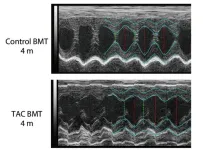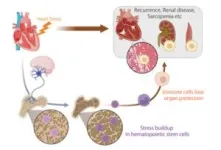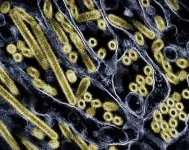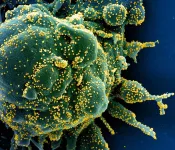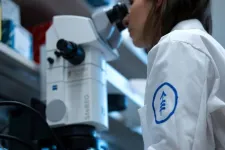(Press-News.org) The stress of heart failure is remembered by the body and appears to lead to recurrent failure, along with other related health issues, according to new research. Researchers have found that heart failure leaves a “stress memory” in the form of changes to the DNA modification of hematopoietic stem cells, which are involved in the production of blood and immune cells called macrophages. These immune cells play an important role in protecting heart health. However, a key signaling pathway (a chain of molecules which relays signals inside a cell), called transforming growth factor beta (TGF-β), in the hematopoietic stem cells was suppressed during heart failure, negatively affecting macrophage production. Improving TGF-β levels could be a new avenue for treating recurrent heart failure, while detecting accumulating stress memory could provide an early warning system before it occurs.
Healthier lives and improved well-being are among the United Nations’ global Sustainable Development Goals. Positively, a recent study shows that life expectancy worldwide is projected to increase by about 4.5 years by 2050. Much of this is thanks to public health efforts to prevent disease and improved survival from illnesses, such as cardiovascular disorders. However, heart disease is still the leading cause of death worldwide, with 26 million people estimated to be affected by heart failure.
Once heart failure has occurred, it has a tendency to reoccur along with other health issues, such as kidney and muscle problems. Researchers in Japan wanted to understand what causes this recurrence and the deterioration of other organs, and whether it can be prevented.
“Based on our earlier research, we hypothesized that recurrence may be caused by stress experienced during heart failure accumulating in the body, particularly in hematopoietic stem cells,” explained Project Professor Katsuhito Fujiu from the Graduate School of Medicine at the University of Tokyo. Hematopoietic stem cells are found in bone marrow and are the source of blood cells and a type of immune cell called macrophages, which help to protect heart health.
By studying mice with heart failure, the researchers found evidence of stress imprinting on the epigenome, that is, chemical changes occurred to the mice’s DNA. An important signaling pathway, called the transforming growth factor beta, which is involved in regulating many cellular processes, was suppressed in the hematopoietic stem cells of mice with heart failure, leading to the production of dysfunctional immune cells.
This change persisted over an extended period of time, so when the team transplanted bone marrow from mice with heart failure into healthy mice, they found that the stem cells continued to produce dysfunctional immune cells. The latter mice later developed heart failure and became prone to organ damage.
“We termed this phenomenon stress memory because the stress from heart failure is remembered for an extended period and continues to affect the entire body. Although various other types of stress might also imprint this stress memory, we believe that the stress induced by heart failure is particularly significant,” said Fujiu.
The good news is that by identifying and understanding these changes to the TGF-β signaling pathway, new avenues are now open for potential future treatments. “Completely new therapies could be considered to prevent the accumulation of this stress memory during hospitalization for heart failure,” said Fujiu. “In animals with heart failure, supplementing additional active TGF-β has been shown to be a potential treatment. Correcting the epigenome of hematopoietic stem cells could also be a way to deplete stress memory.”
Now that it has been identified, the team hopes to develop a system that can detect and prevent the accumulation of stress memory in humans, with a long-term goal of being able to not only prevent the recurrence of heart failure, but also catch the condition before it can fully develop. DOI: 10.1126/sciimmunol.ade3814
#####
Paper Title
Yukiteru Nakayama, Katsuhito Fujiu, Tsukasa Oshima, Jun Matsuda, Junichi Sugita, Takumi James Matsubara, Yuxiang Liu, Kohsaku Goto, Kunihiro Kani1, Ryoko Uchida, Norifumi Takeda, Hiroyuki Morita, Yingda Xiao, Michiko Hayashi, Yujin Maru, Eriko Hasumi, Toshiya Kojima, Soh Ishiguro, Yusuke Kijima, Nozomu Yachie, Satoshi Yamazaki, Ryo Yamamoto, Fujimi Kudo, Mio Nakanishi, Atsushi Iwama, Ryoji Fujiki, Atsushi Kaneda, Osamu Ohara, Ryozo Nagai, Ichiro Manabe, Issei Komuro. Heart failure promotes multimorbidity through innate immune memory. Science Immunology. 24 May 2024.
Useful Links:
Graduate School of Medicine: https://www.m.u-tokyo.ac.jp/english/
The University of Tokyo Hospital: https://www.h.u-tokyo.ac.jp/english/
Funding:
This study was supported by the Grant-in-Aid for Scientific Research from JSPS, AMED, and JST (JP 18K08061, 21K08122, 21ek0210157h0001 to Y.N.; JP17H05594, JP17H04171, 17H04171, 19K22615, 20ek0109423h0001, 22gm6510010h0002, 23ek0210193h0001 to K.F.; JP19H03648, JP20H04938, JP20K21594, JP21gm5010002 to I.M.; JPMJMS2023 to K.F. and I.M.; and JP20gm0810013, JP20ek0109440, JP20ek0109487, JP20ek0109406, JP20km0405209, JP20ek021014, JP20ek0210118, JP20ek0109367, JP19bm0804010 to I.K.), and grants from the MSD Life Science Foundation International, Japan Foundation for Applied Enzymology, the Japan Cardiovascular Research Foundation (to Y. N.), and the Takeda Science Foundation and Uehara Memorial Foundation (to. I.M.).
Competing interests
None.
Research Contact:
Project Professor Katsuhito Fujiu
Department of Advanced Cardiology
Graduate School of Medicine
The University of Tokyo, 7-3-1 Hongo
Bunkyo-ku, Tokyo, 113-8655, Japan
Tel.: +81-3-3815-5411
Email: fujiu-tky@g.ecc.u-tokyo.ac.jp
Press contact:
Mrs. Nicola Burghall (she/her)
Public Relations Group, The University of Tokyo,
7-3-1 Hongo, Bunkyo-ku, Tokyo 113-8654, Japan
press-releases.adm@gs.mail.u-tokyo.ac.jp
About the University of Tokyo
The University of Tokyo is Japan’s leading university and one of the world’s top research universities. The vast research output of some 6,000 researchers is published in the world’s top journals across the arts and sciences. Our vibrant student body of around 15,000 undergraduate and 15,000 graduate students includes over 4,000 international students. Find out more at www.u-tokyo.ac.jp/en/ or follow us on X at @UTokyo_News_en.
END
Understanding a broken heart
Recurrent heart failure linked to accumulated stress in immunity-forming stem cells
2024-05-24
ELSE PRESS RELEASES FROM THIS DATE:
Genetic cause of rare childhood immune disorders discovered
2024-05-24
Scientists have pinpointed genetic changes that can leave children born with little to no immune defence against infection.
In a new study of 11 affected individuals, researchers from Newcastle University, the Wellcome Sanger Institute, the Great North Children’s Hospital, and their collaborators were able to link mutations in the NUDCD3 gene to Severe Combined Immunodeficiency and Omenn syndrome1 – rare and life-threatening immunodeficiency disorders. These mutations prevented the normal development of diverse immune cells needed to combat different pathogens2.
The findings, published today (24 May) in Science Immunology, ...
With wobbling stars, astronomers gauge mass of 126 exoplanets and find 15 new ones
2024-05-24
LAWRENCE — Using data from the Transiting Exoplanet Survey Satellite and W.M. Keck Observatory on Mauna Kea in Hawaii, an astronomer at the University of Kansas led a study appearing today revealing 15 new exoplanets — planets beyond our solar system — along with the mass of 126 other exoplanets. The findings give astronomers new understanding of the makeup of exoplanets and their star systems generally.
The study cataloging the exoplanets — comprising severe and exceptional environments, some of which hold promise to support life — was conducted under auspices of the TESS-Keck Survey and appears ...
High H5N1 influenza levels found in mice given raw milk from infected dairy cows
2024-05-24
WHAT:
Mice administered raw milk samples from dairy cows infected with H5N1 influenza experienced high virus levels in their respiratory organs and lower virus levels in other vital organs, according to findings published in the New England Journal of Medicine. The results suggest that consumption of raw milk by animals poses a risk for H5N1 infection and raises questions about its potential risk in humans.
Since 2003, H5N1 influenza viruses have circulated in 23 countries, primarily affecting wild birds and poultry with about 900 human cases, primarily among people who have had close contact with infected birds. In ...
Study finds discreet shipping used to sell e-cigarettes to minors
2024-05-24
Researchers at the U of A found self-identified small business owners on TikTok are circumventing a number of local, state and federal laws that restrict the individual sale of tobacco products. Specifically, the researchers found that 45% of the videos highlighted the fact that they did not require identification to verify the purchaser’s age.
“Many states have laws that govern procedures necessary to sell e-cigarettes,” explained lead researcher Page Dobbs, an associate professor of public health in the Department of Health, Human Performance and Recreation ...
African scientists call for equitable research partnerships to advance microbiome research
2024-05-24
Leading African scientists have issued a compelling call for more equitable research partnerships in a new paper published in Nature Medicine. The paper underscores the critical need for fair and collaborative research efforts to explore the unique and diverse microbiomes found in African populations and environments. Historically, these microbiomes have been underrepresented in global studies.
Over the past two decades, our understanding of the role played by the microbiome in different ecosystems has significantly expanded. For ...
How COVID-19 'breakthrough' infections alter your immune cells
2024-05-24
LA JOLLA, CA—New research from scientists at La Jolla Institute for Immunology (LJI) suggests people who received COVID-19 vaccines and then experienced "breakthrough" infections are especially well armed against future SARS-CoV-2 infections.
By analyzing blood samples from study volunteers, the LJI researchers discovered that people who experienced symptomatic breakthrough infections develop T cells that are better at recognizing and targeting SARS-CoV-2, including the Omicron and Delta variants. The researchers describe this increased protection as an "immunity wall."
"The virus evolves, but, importantly, so does the immune system. T cells ...
Virginia Tech entomologist sheds light on 250-year-old mystery of the German cockroach
2024-05-24
May 24, 2024 --
A team of international scientists, including Virginia Tech entomologist Warren Booth, have solved the 250-year-old origin puzzle of the most prevalent indoor urban pest insect on the planet: the German cockroach.
The team's research findings, representing the genomic analyses of over 280 specimens from 17 countries and six continents, show that this species evolved some 2,100 years ago from an outside species in Asia and were released this week in the Proceedings of the National Academy of Sciences journal.
One ...
Advancing skin science: explore Skin Ageing & Challenges 2024 Strategic Topics in Malta this November
2024-05-24
Get introduced to the latest advances in skin research at the 15th International Conference on Skin Ageing & Challenges 2024 on November 5-6 at Corinthia Palace in Malta.
Skin Ageing & Challenges 2024 will cover the hottest topics shaping the future of skin aging and rejuvenation.
How will Skin Ageing & Challenges 2024 Expand Your Knowledge?
Senolytics: Exploring new ways to fight cell aging with innovative senolytic treatments.
Extracellular Vesicles: Discovering the potential of EVs for skin regeneration and repair.
Skin Microbiota / Mitochondria Transplantation: Introducing approaches to harness the power of microbiome and mitochondrial transplantation ...
Controlling water, transforming greenhouse gases
2024-05-24
Carbon dioxide is the greenhouse gas, singlehandedly responsible for 78% of the change in energy balance in Earth's atmosphere between 1990 and 2022.
A byproduct of burning fossil fuels, carbon dioxide enters the atmosphere from car exhaust and coal-fired power plants. Even some renewable energy resources produce a small amount of carbon dioxide, although at a tiny fraction of the amount coal and natural gas create.
At its core, this molecule is just an arrangement of one carbon and two oxygen atoms that can be reorganized through a ...
MSK Research Highlights, May 24, 2024
2024-05-24
New research from Memorial Sloan Kettering Cancer Center (MSK) investigates a promising approach against diabetic retinopathy and finds patients with early-onset colorectal cancer likely don’t need more frequent surveillance colonoscopies.
Anti-ceramide immunotherapy promising against diabetic retinopathy, animal studies suggest
Diabetic retinopathy is a condition that affects blood vessels in people with diabetes and can cause blindness. Now a new study from a team at MSK, Michigan State University, and the University of Oklahoma Health Sciences Center shows that diabetic retinopathy can be considered a “ceramidopathy” — which ...
LAST 30 PRESS RELEASES:
Transient Pauli blocking for broadband ultrafast optical switching
Political polarization can spur CO2 emissions, stymie climate action
Researchers develop new strategy for improving inverted perovskite solar cells
Yes! The role of YAP and CTGF as potential therapeutic targets for preventing severe liver disease
Pancreatic cancer may begin hiding from the immune system earlier than we thought
Robotic wing inspired by nature delivers leap in underwater stability
A clinical reveals that aniridia causes a progressive loss of corneal sensitivity
Fossil amber reveals the secret lives of Cretaceous ants
Predicting extreme rainfall through novel spatial modeling
The Lancet: First-ever in-utero stem cell therapy for fetal spina bifida repair is safe, study finds
Nanoplastics can interact with Salmonella to affect food safety, study shows
Eric Moore, M.D., elected to Mayo Clinic Board of Trustees
NYU named “research powerhouse” in new analysis
New polymer materials may offer breakthrough solution for hard-to-remove PFAS in water
Biochar can either curb or boost greenhouse gas emissions depending on soil conditions, new study finds
Nanobiochar emerges as a next generation solution for cleaner water, healthier soils, and resilient ecosystems
Study finds more parents saying ‘No’ to vitamin K, putting babies’ brains at risk
Scientists develop new gut health measure that tracks disease
Rice gene discovery could cut fertiliser use while protecting yields
Jumping ‘DNA parasites’ linked to early stages of tumour formation
Ultra-sensitive CAR T cells provide potential strategy to treat solid tumors
Early Neanderthal-Human interbreeding was strongly sex biased
North American bird declines are widespread and accelerating in agricultural hotspots
Researchers recommend strategies for improved genetic privacy legislation
How birds achieve sweet success
More sensitive cell therapy may be a HIT against solid cancers
Scientists map how aging reshapes cells across the entire mammalian body
Hotspots of accelerated bird decline linked to agricultural activity
How ancient attraction shaped the human genome
NJIT faculty named Senior Members of the National Academy of Inventors
[Press-News.org] Understanding a broken heartRecurrent heart failure linked to accumulated stress in immunity-forming stem cells
